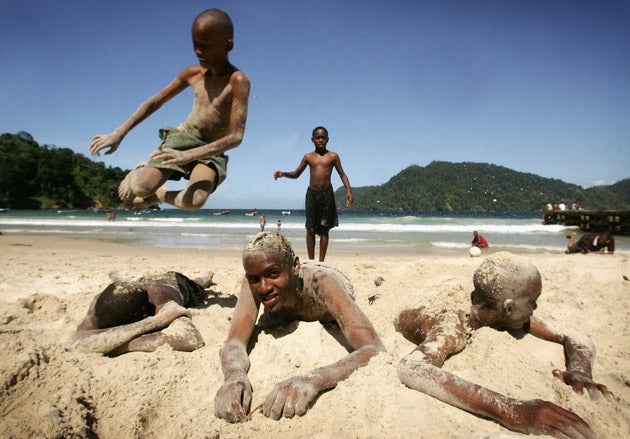The Island Quintet, By Raymond Ramcharitar
A carnal carnival in the Caribbean jungle of desire

Between 1838 and 1917 some half- a- million Indians – "coolies" - arrived in the West Indies, shipped by the British to work in canefields abandoned by freed African slaves. The Indians were scab labourers, greeted with hostility by the Blacks left largely destitute upon emancipation. The region was already a multi-ethnic space, occupied by several European nations, all fighting for land and resources. The indigenous Amerindians were practically wiped out in the process. It was in this maelstrom of ethnic rivalries and violence that the British ships landed their cargoes of coolies.
Just over a century and a half later, a descendant of one of the coolies travelled to Stockholm to receive the Nobel Prize in Literature. It was a momentous journey, symbolising the movement from illiteracy to mastery of the coloniser's language; from the canefield to the hallowed groves of the academy. The Indians in Trinidad had laid down cutlass, taken up pen, and produced VS Naipaul.
He described Trinidad and ancestral India as areas of darkness, fraught with ethnic, tribal and caste divisions, but the Indo-Trinidadians, accustomed to plantation brutalities, tolerated such relatively mild insults from one of their own. Indeed, they accepted his outburst as the decisive voice of one of their ancestral deities; after the Nobel Prize in 2001, images of Naipaul found their way into many of Trinidad's Hindu temples, beside Shiva, Kali and other gods who, on occasions, sent drought or flood or whitefolk to punish them.
Such is the reverence with which Naipaul is held that Indo-Trinidadian writers labour in his shadow. It is almost like a new form of indentureship, except a willing one. Raymond Ramcharitar is one of the most talented writers working the Naipaulian themes of political corruption, sexual degradation, Indian inadequacy and unfinished societies.
Naipaul's A House for Mr Biswas, Mimic Men, and Guerrillas are condensed in The Island Quintet, Ramcharitar's first foray into prose fiction. Five stories flay the Trinidadian body with such persistence that the reader is left battered. But it is a crafted rage, for Ramcharitar's concern is as much with form as with subject. (He was taught poetry by Derek Walcott in Boston).
The remarkable quality of this book is how closely observed character and landscape are, a precision which pays homage to both Naipaul and Walcott. The prose simmers, then erupts into outrageously satirical commentary on island life, the calms down again, Ramcharitar displaying a superb control of narrative flow.
All the stories explore inter-racial sex, white, black and brown bodies manoeuvring obscenely and dangerously in a jungle of desire, stalking out territory, pouncing without mercy. Ramcharitar relishes the stereotype of fast, furious and capricious sex in the tropics. He creates blonde women of ethereal beauty who are tempted into pornographic acts by natives or whose own predatory instincts are liberated in a tropical environment. African and Indian genuflection to the white body and mind is the condition of modern Trinidad. Complexes bred in the 19th century are so embedded that the racial hierarchy persists even in the post-independence era.
Such complexes extend to homosexual relationships, the region nurturing its Victorian inheritance of hatred. Black homophobia is well known from rap lyrics. Ramcharitar squares up to provoke a Hindu backlash by invoking the Ramayana, suggesting that Rama's rejection of Sita can be due to his sexuality. Many of Ramcharitar's stories are concerned with the predicament of gay people, a subject almost wholly hushed up in West Indian literature.
The question haunting this collection is: what is the role of the artist in a society such as Trinidad? Ramcharitar at first gives a Naipaulian answer: escape. However, his characters, though they leave for London and New York, are soon drawn back to the island, its ethnic rages, transgressive sex and political corruption. The very materials for art are to be found richly there. Walter Raleigh once sat in a veranda in Trinidad dreaming of finding gold, not realising that it was to be mined in the voraciousness of human appetite. If only he had Ramcharitar's collection as his map.
David Dabydeen co-edited the 'Oxford Companion to Black British History' (OUP)
Join our commenting forum
Join thought-provoking conversations, follow other Independent readers and see their replies
Comments